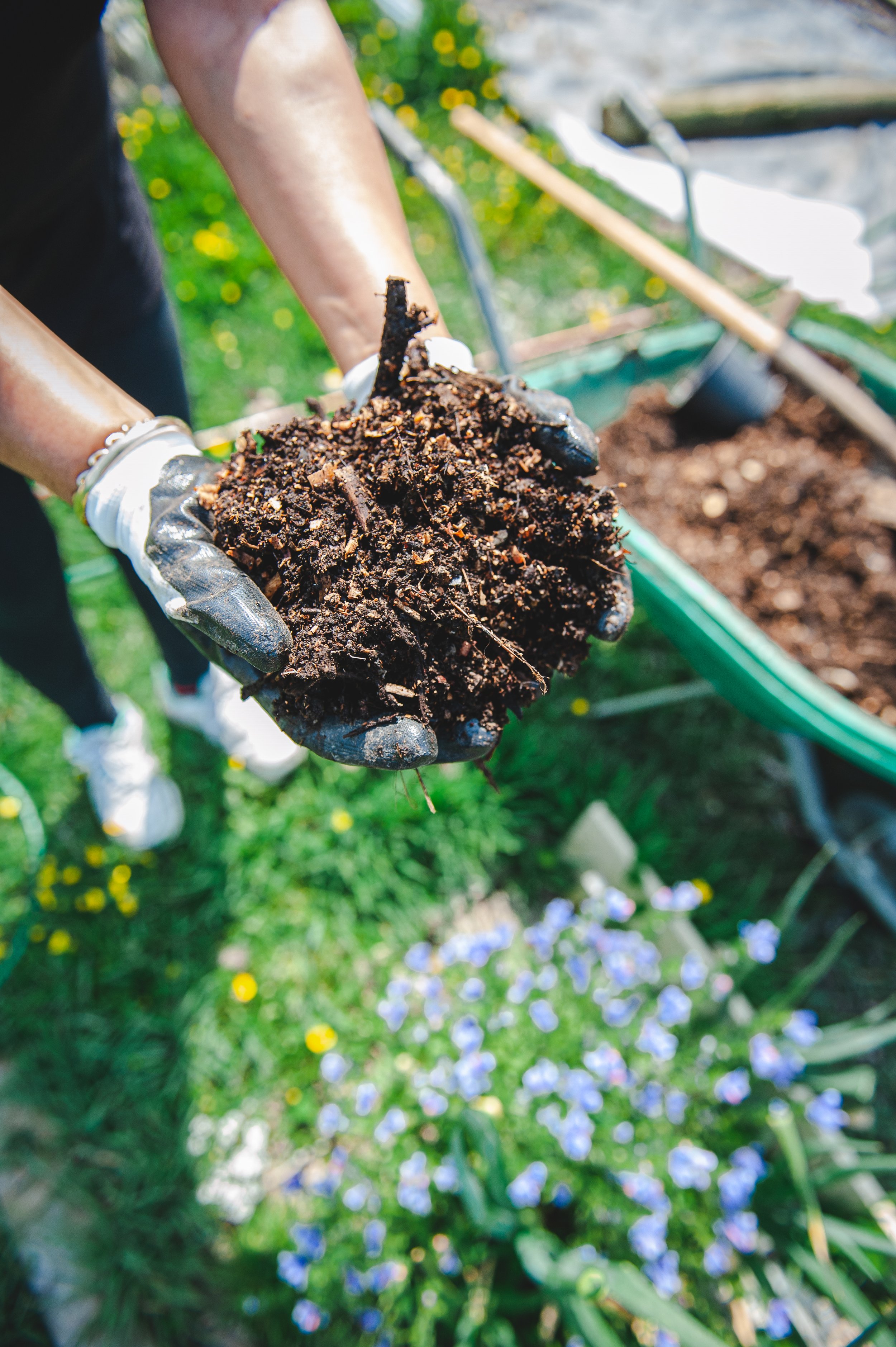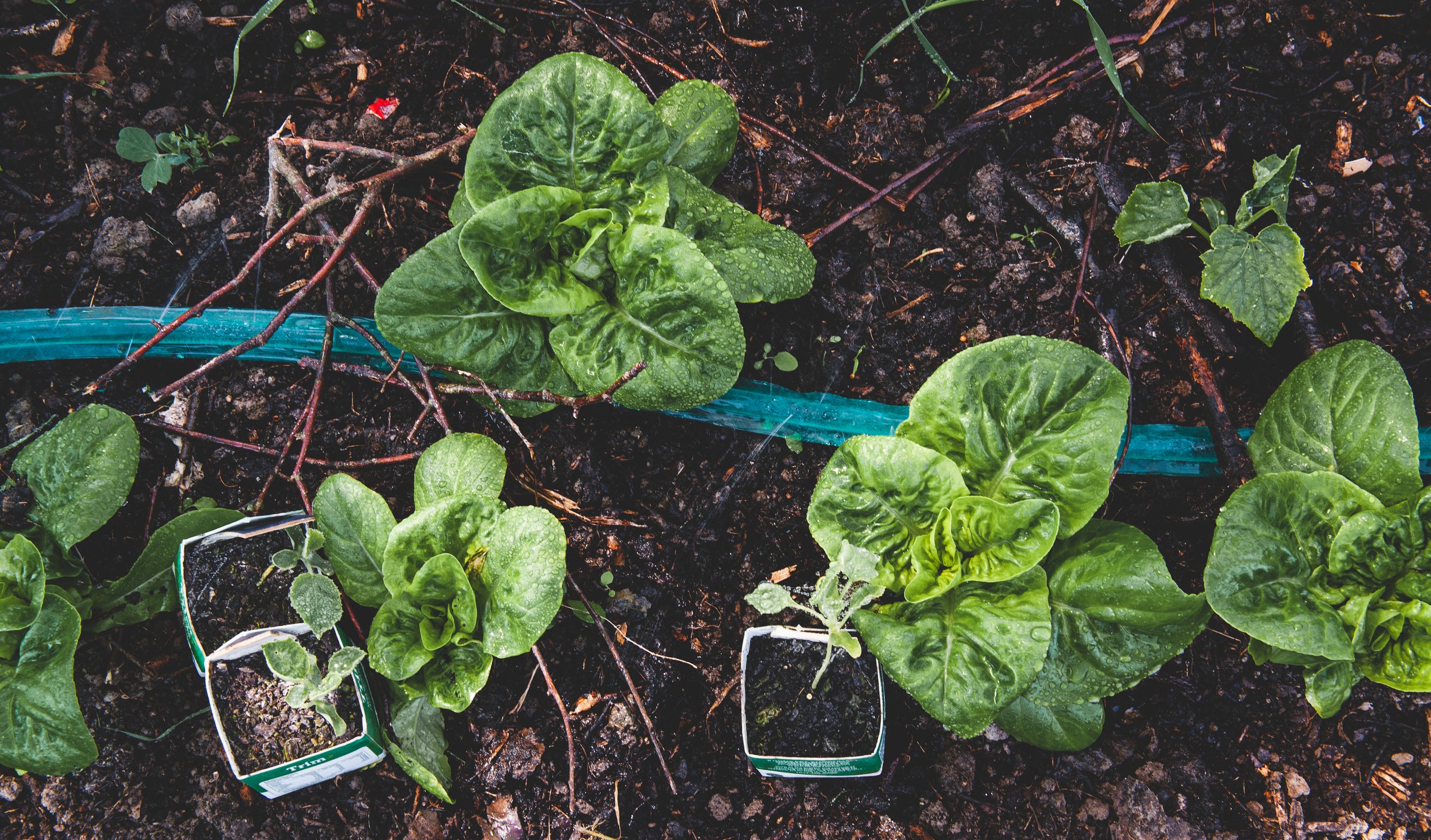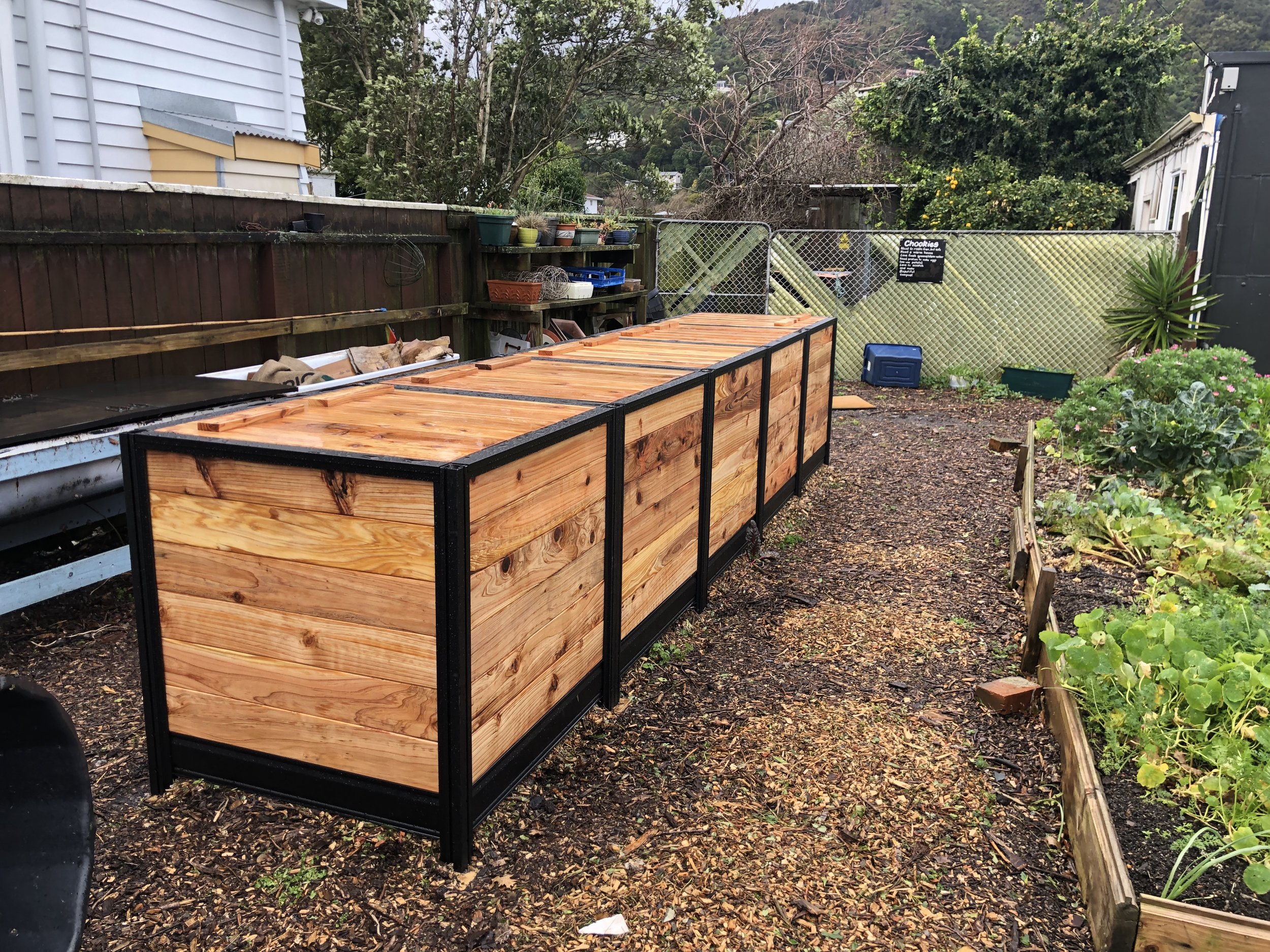
Compost Hub
We are big about compost and are always looking for ways to turn waste into beautiful compost teeming with life.
Divert organic material going to landfill and recycle your food scraps with us.
Together, we compost.
Why Compost?
The Urban Kai Network grows healthy food for our community. We need compost to do that.
Food scraps are currently not accepted in the Council’s green waste service. So without composting, they end up in the garbage.
Food scraps make up about a third of household waste. They make garbage smelly, heavy, and cost money for a bigger bin.
Food scraps end up in landfills where they take up a lot of space. Landfills are filling up quickly, and won’t work in the long run. Food scraps also release harmful greenhouse gases that contribute to climate change. In fact, reducing food waste in landfills is part of the Hutt City Council’s Community Climate Change Response.

That’s where composting comes in
What is compost
Composting is nature’s recycling system. Microorganisms and worms turn food scraps into soil that can go straight to the garden. Magic!
Compost is fantastic for the garden. It provides the nutrients plants need to grow healthy and strong, and improves the soil to help it retain water and reduce erosion. Using compost also means we don’t have to buy fertilisers, which pollute the environment as run off and require lots of fossil fuels to make. Using compost instead of chemical fertilisers saves money and the environment too.
We’re throwing out a valuable resource. Let’s use it!
Why sign up?
Let us do the hard work for you.
Our community compost drop-off is perfect for you if:
you don't have the time or space to compost yourself
you’re new to composting and it’s all a bit much—this is a great first step.
We make sure the compost is turned, balanced properly, and not a smelly mess at the back of your section!
How it Works
Sign up! Check the sign up form below
You collect scraps at home. We recommend using a container with a lid, like an ice cream container
Bring to The Remakery—drop off in our bin. We’ll take up to 20 litres per week
Rinse and repeat. We’ll take care of the compost, you just keep collecting!
The Urban Kai Network grows food in mini farms around Te Awa Kairangi ki Tai. The food goes into donated meals, and accessible food in The Remakery Cafe.
To grow healthy vegetables, we need compost. We use compost on our gardens to improve the soil and grow healthy kai. By contributing your food scraps, means we don’t have to buy compost—we can make it ourselves.
This all helps create a more closed loop system. We don’t have to buy fertilisers or food from outside the Hutt Valley—we’ve got everything we need right here.
And perhaps the most important part of our work is learning and doing things together. We envision the Compost Hub as a place to meet other people, learn about the food web, and share skills. We can all support each other to change a problem into a solution.
What we accept
What we don’t accept
-
Lots of compostable packaging needs to go through an intensive hot composting process in order to break down properly. Oftentimes, temperatures have to be very high for several months in order to do the trick. With our small compost hub at The Remakery, we don't have enough volume to get to those temperatures for that long. Some composting material is okay, but it can be a bit tricky, so we're playing it safe.
Products that are home-compostable, commercially compostable, or non-compostable sometimes get mixed up, which would lead to contamination, something we are trying to avoid. Furthermore, compostable packaging does not add nutritional value when composted.
Compostable packaging is still relatively new, and with growing awareness, we are learning about chemical additives that leave nasties behind in our compost. Not all additives are bad, but some do not break down well and may cause harm to soil ecology.
We encourage the use of reusable products over single-use compostable products.
-
Many tea bags contain thermoplastics such as polypropylene (non-biodegradable plastic). While these plastics are food grade, they don’t necessarily break down easily and our compost hub may not be able to do a proper job of downcycling them.
Most tea bags available in New Zealand are sealed with thermoplastics, while there are a few brands offering home-compostable tea bags, it can be tricky for us to tell the difference and could lead to contamination.
We encourage you to reduce waste from your tea consumption by switching to loose leaf tea. However, if you cannot do without tea bags, you can cut them open and compost the contents, then throw out the bag in your general waste.
-
Dairy products and eggs tend to have high moisture content and are not very substantial as they have a low material structure, this can lead to inadequate moisture to material ratios. They also have high fat content, which slows down the composting process by creating water-resistant coating around other materials, this displaces moisture and reduces air flow, the beneficial microorganisms responsible for breaking down material need air to function correctly, so this barrier tends to cause problems. Dairy products can also lead to strong smells and attract animals like rats. This often happens due to clumps of food sticking together and causing anaerobic decomposition.
Dairy products can be successfully composted with methods such as Bokashi, or by mixing it with plenty of dry fibrous material (browns), but as The Compost Hub at The Remakery only processes compost on a small scale, we aren’t currently equipped with processing dairy.
-
Meat can harbour unhealthy bacteria and decomposing flesh tends to produce an unpleasant odour, which can attract flies. The high protein content of meat can also attract rodents, while rats can be part of the decomposition process, we’d prefer not to encourage them at The Remakery.
Similar to dairy products, meat can be successfully composted with methods such as Bokashi, or with careful mixing of materials and turning, but as The Compost Hub at The Remakery only processes compost on a small scale, we aren’t currently equipped with processing meat products.
-
Faeces from carnivorous animals can contain campylobacter, E. coli and salmonella type bacteria and parasitic worms, which can be transferred to humans. Hot composting that reaches 60°C or greater for at least 3 consecutive days is required to kill most parasites and pathogens and the process must be done with great care. However, it is still not recommended to use this compost on food-generating plants, instead it can be used on ornamental plants.
The compost at The Remakery is destined to be used on our vegetable beds and we don’t have a separate composting system set up for pet waste. If you would like to compost your pets waste, we recommend you look into pet waste bokashi composting systems.
-
We do accept small quantities of spray-free plant trimmings (leaves, grass clippings, and shredded garden debris). When it comes to weeds, some have very strong roots which can continue to grow even when pulled out of the soil and could survive in our compost system, this could lead to us introducing unwanted plants to our farms. A well-maintained hot compost pile can kill weeds and their seeds, but we don't have enough volume to get to the required high temperatures for long enough, so we avoid plants and seeds such as bulbous onion weed, oxalis, tradescantia, kikuyu, couch grass, dock and bindweed, which can be difficult to kill and survive in many composting systems.
Weeds often do contain many beneficial nutrients that can be recycled into the soil, if we change our perspective from “weeding” to “nutrient harvesting”, the garden chore becomes less of a chore and we can start to appreciate these nutrient-rich plants. Difficult to kill plants can be solarised, which essentially smothers and cooks them, “Black Hole” bags are an effective method for this. Alternatively, they can be drowned for a month in a bucket, this will cause them to rot and will produce a liquid fertiliser that can be used in the garden. We aren’t currently offering these weed processing methods for the Compost Hub, but let us know if this is something you might be interested in.
-
Yes, you can! Mouldy food has already started decomposing. There are many different types of microorganisms that are part of the decomposition process and mould cells are one of them.
Some types of mould are indications the compost is successfully decomposing, while others such as green mould may indicate there is an inadequate moisture to material ratios, we regularly inspect our compost heaps and are able to balance the ingredients if needed.
Black mould, however, should be avoided in a compost pile. Darker coloured moulds are a sign of rotting and putrefaction, while many causes of rot aren’t harmful in a compost pile and can in fact be beneficial, some may spread diseases and encourage pests.
We do recommend care be taken when handling mouldy food by avoiding inhalation of fungi, as this can lead to infections such as Aspergillosis and Histoplasmosis.
-
Absolutely! We love our community getting involved. Our Compost Hub needs regular maintenance which includes turning the pile, weighing and recording compost contributions, temperature checks, moisture checks and shifting completed compost.
If you are an expert in compost and would like to share your time, help us learn, develop our composting methods, or teach at workshops, please get in touch!
-
We run composting workshops at The Remakery, check out our What’s On page to see when our next workshop is. We also invite you to come to our regular gardening sessions, where you will have the opportunity to chat with our team of growers and ask questions.
Compost FAQs

Cost
If you’d like to donate to support this initiative, a donation of $3/week would be greatly appreciated, but this is not necessary to take part.
The Compost Hub Pilot is made possible through the support of:
Our generous donors.
Large contributions
Is your business looking at ways to reduce your waste that ends up at landfill?
We have partnered with organisations to take waste such as coffee sacks, coffee chaff, used coffee grounds, wood shavings, brewery spent grain, food waste, and other compostable things. Have a chat with us to see if we can help you reduce your waste, additionally the compost we can create will help us grow kai for the community. A win-win!
Contact Urban Kai Farms
Visit us:
The Remakery
310 Waiwhetū Road
Fairfield
Lower Hutt 5011
Phone us:
04 260 3343
Email us:
togetherwegrow@cupa.org.nz






